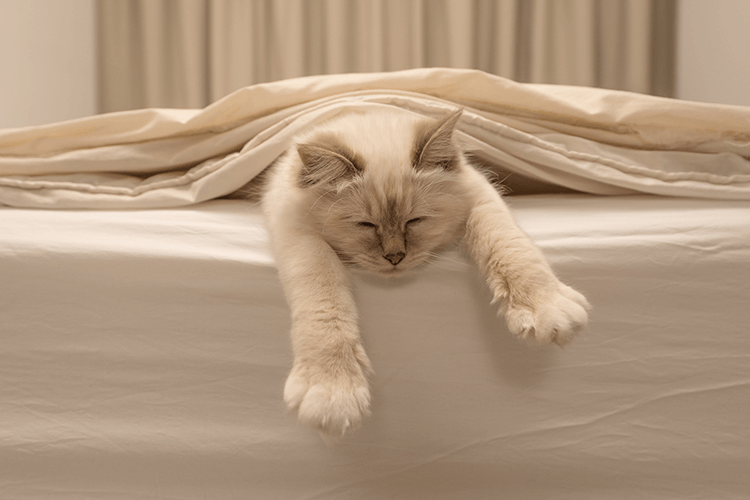As winter is plundering along you may be starting to think that if your cat had an alarm clock he would be hitting snooze for the third time. Like a teenager on the weekend, you’re starting to feel like you haven’t seen your kitty awake in awhile. Is it just you or does he seem to be sleeping more since the snow started falling and the temperatures dropped? Cats sleeping more during the winter is a very real and natural thing and there are a couple of different theories why.
Normal Cat Sleep
Fifteen to 20 hours a day is a normal range for your cat to be sleeping. In the wild, a cat’s times spent awake are centered around dawn and dusk in order to be more efficient hunters. In your home, awake time is more focused on mealtimes or times when you’re there. All this sleep is necessary to provide energy for hunting and digesting.
Hibernation, Torpor, or Something Else?
Think back to your high school biology class, remember hibernation? Hibernation is that fantastic adaptation that some animals go through in the winter months. Bears are the posterchild for hibernation, but cats in the wild can go through a modified version of hibernation, called torpor, when times get tough during the winter. While it’s not true hibernation, these cats experience a drop in body temperature and metabolism during those hours of sleep and then return to normal once they wake up. They will also spend more hours sleeping per day during torpor in order to conserve even more energy. While your purry pal isn’t necessarily going through harsh times when winter rolls around, he may enter a state of torpor to conserve energy like his wild relatives do.
Feline Blue?
With winter’s cold temperatures, short days, and various illnesses being more prevalent, we as humans can become a little depressed. Seasonal depression affects many of us when light levels get low and we’re forced to hole up indoors. Some veterinarians believe that seasonal depression can affect our feline friends as well. Think about it, wintertime can really shake up your kitty’s daily routine. Their late afternoon sunbathing sessions in the bay window get canceled due to early darkness, their once comfortable house becomes cooler and possibly filled with holiday houseguests, and the noisy furnace scares them every time it turns on.
As with humans, depression in our kitties can lead to more time spent sleeping. You may also notice an increase or decrease in her appetite and she might become crankier. If you notice a change in your kitty’s behavior, including sleeping more, always visit your veterinarian to rule out possible medical issues.
How to Help
In most instances cats sleeping more is due to natural causes such as torpor. If you have ruled out medical issues for lethargy and suspect that your kitty may be feeling the affects of seasonal depression here are a few ways to help him cope.
- Light it up: Your cat needs exposure to light to increase the release of serotonin, a major mood enhancer. While you’re off to work consider leaving the blinds or curtains open or place a cat perch near a window so your kitty can enjoy the natural light. You can also safely leave a lamp on near where your cat spends the majority of his time as a second-best alternative.
- Keep him active: Just because you’re locked indoors doesn’t mean you can’t be active. Make sure to leave time to interact with your kitty everyday. You can play, snuggle, or give him some interactive toys. Hanging a birdfeeder outside a window can also provide some much needed mental stimulation.
- Turn up the heat: Many of us try to pinch pennies in the winter by leaving the heat off when we’re not at home, but a cooler house can lead to some stress for your cat. Combat it by giving him a warm place to go, whether that is a heated cat bed or a comfy spot in front of the heater.
If your good buddy seems to be hitting the hay more than usual this winter chances are it’s a natural process that traces back to his wild ancestors. However, it could also be due to medical issues or seasonal depression. Make sure to have your feline friend checked by a veterinarian before winter rolls around so you and your cat can enjoy the extra indoor time together.






